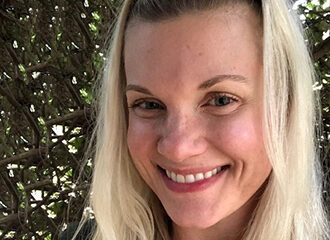Summer can be a rather difficult season for those suffering from an eating disorder, making the recovery process even harder. In this post, we look at five of the biggest challenges, and tips for combating each one.
Ahh, sweet summer! The birds are chirping, the sun is shining, humidity rising, and for some folks – the ever-present awareness of our body size rises with that humidity. While, for some, summer is their favorite time of the year, for people suffering from an eating disorder, it can be particularly challenging.
5 Biggest Challenges (& Tips to Combat Them)
1) Schedule Changes
While the change in routine might be welcomed for some, it could impact recovery. Routine makes us feel comfortable because we know what to expect, what the rules are, and where to be at what time. When those routines change, it can mean a disruption in the day-to-day schedule that fosters recovery.
Pro Tip: Make a calendar or daily agenda for the summer months to help you stay on track with your meal plan, dietitian and therapist appointments, sleep schedule, and self-care. Don’t forget to schedule in some fun.
2) Heightened Focus on Body Image
All that fun in the sun can make folks more aware of their own bodies than they would in the winter when they’re wrapped up in a sweater. In the summer, we typically spend more time in shorts, tank tops, and swimsuits, which can increase time spent body checking and preoccupation with weight and size. Folks also tend to spend time with others who are wearing swimsuits, shorts, etc. and that can also increase comparison, as well as an increase in eating disorder thoughts, urges and behaviors.
Pro Tip: Make a plan to talk with your therapist or treatment team prior to any body image exposures that could be particularly difficult to navigate. Make yourself and your treatment a priority by saying, “No thanks” to any situations that could hinder recovery.
Pro Tip #2: Make a summer bucket list that has nothing to do with changing your body. Often when struggling with an eating disorder, the world seems small and your mind stays focused on those behaviors. Your eating disorder will want you to focus on your body and food this summer, but what would you actually like to spend your time doing? When you look back on this season of your life, what do you want to remember about it? Your deeply held values can help guide you as you create your list.
3) Less Time in Structured Environments
Less structure usually means more free time. This should be great, right? For folks with an eating disorder, a common struggle is learning to manage free time in their personal lives, especially during the summer months. Frequently, we see an increase of eating disorder behaviors and urges pop up when folks are feeling bored or lacking structure in their routines.
Pro Tip: Keep eating disorder recovery a priority, even during downtime. This summer might be a break from school, work, or other obligations – but not from your recovery! Do your best to maintain appointments and check-ins, read articles and blogs that are recovery focused, listen to recovery podcasts, and if you feel like you need more support, reach out to people you trust, and ask your provider for referrals to support groups.
4) More independence? Less independence?
I-n-d-e-p-e-n-d-e-n-t do you know what that means? For those in recovery from an eating disorder, a change in the amount you rely on others can impact your treatment. Whether you’re coming home from college to your parents’ home and back to their rules and structure, or if you’re traveling away from home and have more independence, it can be hard to navigate these changes.
Pro Tip: Ask for help. Seek out family, friends, and other solid supports to discuss how the change in independence has impacted your mental health and recovery. For help initiating the conversation, your therapist is your best bet.
5) Diet Culture
The diet, fitness & wellness industries, like mosquitos, always seem to be flying around at inconvenient times and ruining everyone’s day. Magazines highlighting the need to “get that summer body” or this week’s latest fad diet are plastered all over where we shop, work, and travel. While scrolling on social media, advertisements for harmful weight loss products can pop up unexpectedly. While summer is historically meant to be a season of adventure with the wind in our hair, it has transformed into the playground for these multi-billion-dollar industries.
Pro Tip: Using a journal to document triggering situations like this could be helpful in recovery. Make note of what senses became heightened while reading the magazine headlines you found jarring. Take note of your thoughts, physical sensations, urges without any judgment. Allow these emotional responses to rise and fall and remember that all feelings are temporary if we give them some time.
Okay, I read all of this, and I am still struggling with my eating disorder. What can I do?
You are not alone. Reaching out for help can be anxiety-inducing, but it is one of the bravest things you can do. If you don’t have a treatment team of experienced and qualified professionals, we encourage everyone start there. Having a therapist that specializes in eating disorders, along with a dietitian with the same specialty, could be a game-changer in your recovery. If you already have a team and are seeking a higher level of care or increased support, we encourage you – in conjunction with your team, to reach out to a qualified eating disorder treatment facility, like The Renfrew Center, to schedule an assessment.
Please know that recovery from an eating disorder is possible and help is available.



